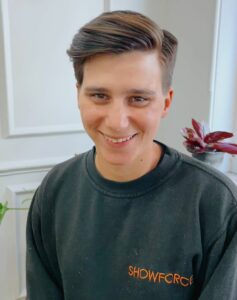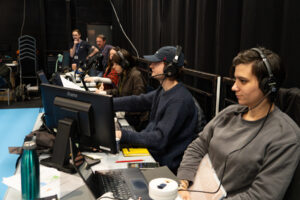Meet Our Senior Lighting Tutor: Berta Pibernat Trias
Berta Pibernat Trias, Senior Lighting Tutor, sat down with us to discuss her background, what studying Technical Production at Mountview looks like, and how it prepares our students for the creative industry.
What is your background?

Berta Pibernat Trias
I started in cinematography and worked in television for a while. However, when getting my BA in San Francisco I discovered theatre. Since then, I have been working as a Programmer and Lighting Designer in fringe and regional theatres. When I moved to London, I began in dance where I worked as a Lighting Designer and Production Manager touring nationally and internationally with a few companies.
“The sheer number of shows at Mountview means there are plenty of opportunities for students to experience a variety of roles, to make mistakes and try things again.”
How would you describe the structure of the training at Mountview?
The training at Mountview is focused on learning by doing, and is therefore very practical and hands-on. All the technical courses start with a term of lessons to make sure we establish a solid technical knowledge base. Then, students work on productions from the spring term of their first year. In the last term, they work on projects, culminating in them working together as a cohort to create their own show. As they move into second year, there are fewer lessons and the majority of the time is spent on productions. The sheer number of shows at Mountview means there are plenty of opportunities for students to experience a variety of roles, to make mistakes and try things again. We are so proud to see that the majority of our graduating students are now working full-time in the creative arts industries.
What makes studying lighting at Mountview stand out?
We teach lighting within our Technical Production course; on this programme, they will learn skills in lighting, sound and video. Combining these disciplines into one course means the students graduate with a wider skillset, thus making them highly employable across a range of roles.
In their first year on the 2-year Foundation (FdA) course, they are taught the basics of lighting theory as well as the technical aspects of the equipment, programming, set up and maintenance. Our teaching labs have a rig they can get their hands-on and we ensure each student is comfortable with the equipment before they go into our venues. We have a series of high-spec computers that run industry standard software for drafting lighting plots and creating the standard paperwork, and visualisers to practice their programming.
“A lot of our students go on to do paid work with these professionals, some before they even graduate! “
If they choose to continue on to the BA Top-Up year, they will get a chance to work towards becoming a lighting designer. This is actualised through completing projects on visualisers, acting as Associate Lighting Designers, and finally getting the opportunity to do their own lighting design for a production, all whilst working alongside industry professional directors, and set, costume and sound designers. This is an opportunity that not all drama schools offer.
What opportunities do students have to gain industry experience and hear from industry professionals whilst training?

Berta and Technical Production students working on Earthquakes in London. (Photo by: Stephen Glass @sglassphoto)
All of the students work closely with industry professional lighting designers. This allows them to learn from the best, expand their pool of contacts and demonstrate their employability – without going offsite. A lot of our students go on to do paid work with these professionals, some before they even graduate!
Work placement is an important part of both the FdA and BA Top-Up courses. Through our wide range of industry contacts, we help students find the best placement for them; one in which they can demonstrate their skill and passion, whilst gaining valuable experience working in different environments. Recent placements have included the Royal Opera House, Old Vic, National Theatre, Royal Academy of Music and a variety of West End theatres. We hear great feedback from these venues about our students’ work.
How do the shows at Mountview support education?
Mountview runs around 26 productions a year which means there are a lot of opportunities for students to immediately get hands-on experience. When students take on roles as programmers and production electricians, they are supervised by staff throughout the process and receive continuous feedback and guidance, allowing them to experiment, explore and make mistakes in a fully supported environment.
“Mountview runs around 26 productions a year which means there are a lot of opportunities for students to immediately get hands-on experience.”
Mountview’s facilities are also exceptional. The stage in the main house replicates West End theatres and the equipment is all up-to-date and industry standard. The lighting stock is made up of a lot of LED fixtures and moving lights that are often used only in larger venues. We also have a smaller studio theatre, that gives students experience of working with a fixed rig, which presents a different style of problem-solving and challenges. We also have three studios for smaller projects and our own mini rig in the lab to use during lessons.
How does the training prepare students for the way that they would work in the industry?
Our students work as crew on the first year so they can get familiar with our venues, become comfortable with the equipment and get a grasp of the way the industry works. We base our structures, teams and roles on a West End model, so students immediately have an experience that replicates working in the industry. We run full technical rehearsal weeks, dress rehearsals and performances in the evenings, to a schedule that would be common in the professional world, giving them a taste of real-life work.
During their second year they will be programming and leading a team as a production electrician.
These roles are key to any production, teaching them not only about the technical side and working with the equipment, but also the ways in which a professional practitioner might problem solve, communicate and deal with other members, whilst getting experience of undertaking a higher position and taking on more responsibility. They will attend production meetings, do crew schedules, paperwork and hires for the designers.
“We base our structures, teams and roles on a West End model, so students immediately have an experience that replicates working in the industry.”
This guarantees they are industry-ready by the end of their second year. Whereas generally new graduates would start their professional journey as a followspot operator or as casual cover staff, our recent graduates have gone straight onto roles including Lead Programmer, Deputy Head of Lighting and Technical Swing.
What advice do you give your students upon graduating, and where can they find work afterwards?
We always advise students to keep in touch with the industry professionals they have encountered at Mountview. Whilst training here, a student usually works on 12 productions – this means working with 6 different lighting designers in different roles, at least 2 programming mentors and one or two industry placements. There are other routes, but building networks is an important part of the industry.
Find out more about our Technical Production training here.